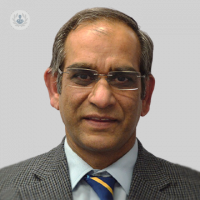Diabetic eye diseases: what you should know
Escrito por:We recently spoke with highly esteemed consultant ophthalmologist, Mr Ijaz Sheikh, who, in our latest article, outlines the main and most common diabetic eye conditions, and details the various different types of laser treatment options that are available for patients who require effective and quick treatment for their given diabetic eye condition.
What are the most common diabetic eye diseases?
Diabetic eye diseases are a group of conditions which affect the eyes of people suffering from diabetes. The main diabetic eye conditions are cataracts, glaucoma, and diabetic retinopathy. In fact, diabetic retinopathy remains the most common complication of diabetes and is the leading cause of visual loss in the working age group, and can, in some cases, lead to blindness.
What are the different types of laser treatment available? Are they painful?
First of all, we need to know why diabetic retinopathy affects the eyesight. There are two mechanisms. Firstly, there is a leakage of fluid, which is also called Temecula, and this condition is called diabetic neuropathy.
The ideal condition for laser treatment is referred to as advanced diabetic retinopathy. When the eye is starved of oxygen, the retina may respond by growing abnormal blood vessels. This sometimes requires surgery in order to be resolved.
The treatment for proliferative diabetic retinopathy is generally advised to protect the eyesight. Prompt treatment can reduce the risk of further vision loss and painful eyes. Each one of these abnormal blood vessels can be treated with anti-VEGF injections or with a standard two coagulation laser.
Anti-VEGF injections work quickly and effectively, but need careful long-term monitoring, and often more doses of injections are required. Laser coagulation is more likely to give long-term relief with just one or two treatment sessions typically being required.
What are the main risks and side effects of laser eye treatment?
The lasers used for the treatment of retina issues in the eye are very small burns that are focused on specific areas where the blood vessels in the eye are leaking. They typically take up to three months to fully kick in and treat diabetic retinopathy effectively.
Unfortunately, there are a handful of potential risks and side effects when it comes to laser treatment for diabetic eye conditions. The main ones include the following:
- retinal scarring
- impaired driving ability
- impaired reading ability
- general discomfort in the eye
Which diabetic eye diseases can be cured by laser treatment?
Laser treatment can help treat and cure the abovementioned diabetic retinopathy, as well as neovascular glaucoma, which is a particularly complex condition to treat without the use of laser treatment.
What is the recovery time after having treatment? What aftercare can a patient expect?
It will take roughly four hours for the region where the laser beam has been applied to return to normal function. It is always advisable for people who are coming for laser treatment not to drive after undergoing their laser eye treatment.
As the light intensity is quite bright, people may feel a bit startled initially, but this will quickly settle down and the brightness will reduce. If the patient is suffering from pain during the treatment, we can of course change the intensity as well as the duration of the laser beam so the patient can tolerate it better.
Patients can go back home around 30 minutes after having their laser treatment. Diabetic retinopathy generally takes up to 12 weeks to start showing its full effect, and, of course, laser treatment can be repeated if it is not right in the centre.
Mr Ijaz Sheikh is a highly accomplished and experienced consultant ophthalmologist who is an expert when it comes to the diagnosis and treatment of diabetic eye conditions. Book a consultation with him today if you are considering undergoing laser eye treatment in the near future.



